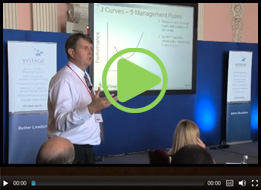Good executives and managers are always looking for ways to improve their business and there are plenty of consultants around the world trying to help them.
These consultants invest in training programs, education, research, case studies and in creating their own intellectual property.
You’re probably familiar with many of the ridiculous management fads over the past few decades: six sigma, business process reengineering, matrix management, management by consensus, core competency… and so forth.
These techniques were all developed by intelligent people and implemented by top-level leaders of very successful businesses. On the surface, they should have worked, right? But did they? Often, the companies that implemented these ideas lost value. And (other than the most obvious reason of sucking the productivity out of their workers) there is one common reason.
Complexity.
Each of these ideas added layers of complexity into the business. Consultants and managers created entire new languages that few in the business understood. Precious time was spent on learning how to add complication to the business, instead of simplifying the business.
I first experienced this at age 25 when I was dropped in the deep end and tasked with running a branch of a software company. It was terrifying; every single person that worked for me was older than me, I’d never run a company and I knew nothing about software.
Have you ever noticed what’s unusual about the IT industry?
The vast majority of information that comes out of an IT person’s mouth makes no sense to the rest of the world. They speak in absurd babble and jargon – it’s an industry that’s riddled with TLAs and EFLAs .
TLAs – Three Letter Acronyms
EFLAs – Extended Four Letter Acronyms
Nobody else in the company spoke this language. So I introduced a rule on day one which was critical and possibly the luckiest and smartest thing I have ever done in my career:
The “plain English” rule.
If you wanted to bring an issue to the leadership table, you had to bring it in plain English. You couldn’t bring it in jargon, because quite frankly I had no idea what you were talking about. Also, what I learned very quickly was that it wasn’t just me that didn’t understand; members of my team didn’t always understand each other either.
Complexity creates confusion and silos. It saps productivity.
Simplicity creates understanding and collaboration. It improves productivity.
Plain English communication has now become a central tenet of RealTimeCEO.
Eliminate the jargon in your business and use “plain English” and you’ll be amazed at the results. It’s that simple.
(The cartoon is courtesy of the Plain English Foundation. They provide training and workshops for businesses in Australia for simplifying corporate communications.)
Video
Nick Setchell's Top 5 Tips to Improve Your Business
This session combines all the powerful and popular concepts of Fiscal Focus with other concepts to assist you manage your people, market, and foundation values.



